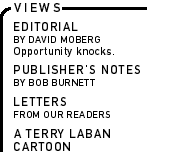

|

|

|

|
|
|
| |
|
|
|
Hate mail and death threats can be par for the course for public figures with dissenting opinions, especially on Israel and the occupied territories. But Rabbi Michael Lerner, editor of liberal Zionist Tikkun magazine, was shocked when the intimidation took a new turn. In May, an extremist pro-Israel Web site called "Masada 2000" listed Lerner as one of "the five most dangerous Jewish enemies of the Jewish people," and posted detailed driving directions to his home address. Draped in guillotines, nooses and racist language, the site repeatedly stated: "If you're ever in the San Francisco area, drop in on him at his home." Predictably, the death threats and hate e-mails started pouring in--more than 60 to date. Late-night calls also drastically increased. "Both my wife and I were extremely scared," Lerner says. So Lerner notified the Anti-Defamation League (ADL), a watchdog of hate crimes. "They did exactly zero," Lerner says, "except tell us that this wasn't a hate crime." The ADL defines hate crimes as those directed against people for their religion, race or ethnicity, and in their view, this was a purely political attack. Yet the Web page is titled "With Jews like these" and targets individuals not just for their criticism of Israel, but specifically for being Jews with that stance. Others targeted on the site are: Dedi Zucker, formerly of Peace Now; liberal Knesset member Ran Cohen; Israel Shahak, Holocaust survivor and current chairman of the Israeli League of Human Civil Rights; and Noam Chomsky. Woody Allen also is lambasted for having asked, "What gives the Jews the right to beat up Palestinians who want only the same rights that Jews have in the country that used to be theirs?" Such Internet-based intimidation was originally and effectively used by anti-abortion extremists. In March, the U.S. Circuit Court of Appeals in San Francisco ruled in favor of a similar Web site called "The Nuremberg Files" on free speech grounds. The anti-choice site includes "wanted" posters naming abortion providers who are crossed off as they are murdered. In late May, Masada 2000 added a note advising viewers not to threaten Lerner's life, stating that "God will deal with the likes of him soon enough." Tikkun was founded in 1986. After just a few issues were published, board member Elie Wiesel left in protest. In 1988, when the first Intifada broke out, other board members--including Alex Schindler, former president of the Reform Judaism movement--also walked. "Schindler was a strong advocate for peace negotiations," Lerner notes, "but Tikkun's call for an end to the occupation was too radical for him. It's always been a politically expensive position to take, but the right one." After Lerner's call about the threats, the ADL did notify the FBI, which eventually visited Lerner and told him that there was little they could do. But it's the ADL's unwillingness to take on the case that most bothers Lerner. "It's ridiculous," he says. "The ADL carries a lot of clout in the Jewish community. The ADL simply needed to follow their standard procedure and put out a public statement saying that such threats were inappropriate. You can bet that if the exact same Web site had led to death threats on the Conference of Presidents [of Major American Jewish Organizations], the ADL would have had something to say about it." Both the ADL and the FBI declined to comment for this story, but Abraham Foxman, national director of the ADL, did send out a mass e-mail calling Lerner's criticisms "baloney" and claiming that the ADL does not turn to the press for such matters. This is not the first scuffle between Lerner and the ADL, nor is the ADL shy about voicing their opinions in the press. The most recent tussle occurred in February when Lerner published an op-ed in the Los Angeles Times calling for an end to the Israeli occupation. The ADL followed with an angry letter to the editor, calling Lerner's piece "a thinly veiled attack on Israel and its governments (past and present)." Clearly, it's not just hate crimes that move the ADL to action.
|

